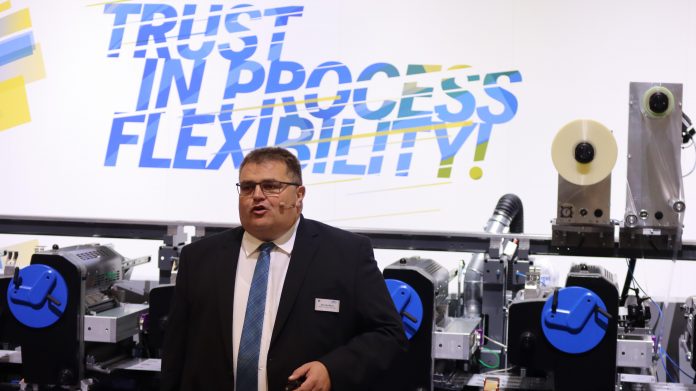
Labelexpo in Brussels continues to be a nice show and the one international show that has consistently good participation from Indian label converters. It also attracts the most courageous Indian entrepreneurs and global suppliers of face stock, pressure-sensitive label stocks, doctor blades, and flexo and digital label presses.
While the Indian economy may have slowed down to 4.9% in Q1 of FY 2019-20, it is still the envy of the rest of the world. A respected and knowledgeable UK journalist said to me, “We would settle for half of that growth number.” And most importantly, two leading Indian label printers said, “Look business is ok, we have to look at our own business and not the GDP numbers.” The younger printer added, “The GDP slowdown if it all, is only an excuse by the consumer product companies to try and lower prices and to pay us even more slowly.”
We came to the show thinking that the flavor of the show would be hybrid presses that combine flexo with digital but our first-day impression is that it is the mid-web and flexible packaging flavor together with full automation that may be the most decisive or influential trend that emerges from the show.
This is clear from our brief and initial visits to the Gallus, Nilpeter, Omet and, HP stands on the first day, about which we will write more extensively in the coming days. Gallus is showing it Labelmaster presses in a wider width and with dramatically more flexibility. Its digital portfolio which is a bit wider than two years ago now has a global footprint and some field learning behind it. The integration with the worldwide Heidelberg setup is “complete” but also a continuous process like other types of relationships.

The Nilpeter stand is also dominated by its mid-web presses and since the company manufactures all its FB Line model presses for customers globally in its plant near Chennai, its perspective is more circumspect and wider than the just the Indian market. In the past year, it has improved its sales within India while global exports continue to dominate its Indian press building capacity. Nilpeter’s Indian representatives at the stand agreed that hybrid presses are needed for the increasingly short runs in the Indian market, but added that while many are talking about this, few are actually buying hybrid configurations yet.
The Omet stand features an interesting and highly automated mid-web press with an integrated gravure unit in the press. The press looks expensive but when we ask its Indian sales representative about this, he says, “Look we have sold more than three dozen expensive presses to the Indian market. The cost of this type of press is not something that will worry many of the larger and growth-oriented Indian companies.”
Lessons of the first day
From this I draw two provisional conclusions – the first that Indian label converters are moving up the value chain, they are looking at flexible packaging or are flexible packaging companies that have integrated labels in their offerings. The other is that many label converters are moving not so much to cartons or lamitubes, but to flexible packaging or pouch production.
This is also borne out by the large HP stand. Now that HP with its digital presses is the largest seller of label presses of any kind, it continues to address the larger packaging market. At the show, it is showing its end to end “pouch on-demand” solution.
Several possible reflections emerge from the first day itself, but let’s have a closer look and talk to more people before sharing these. I am thinking that most probably we should keep listening and be ready to learn from the creative label printers who are here and also to change our minds.










